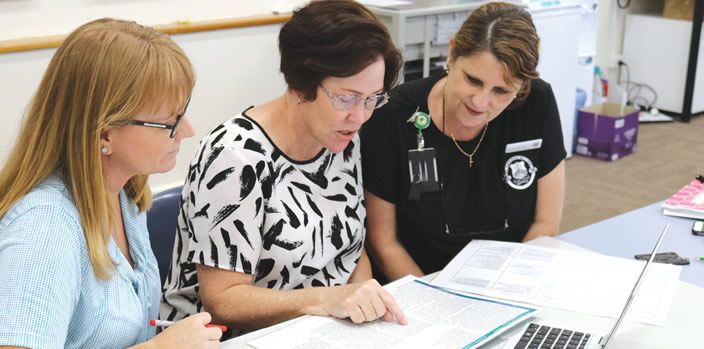Teachers and school officers who specialise in supporting inclusive education for students with additional learning needs have key roles across all sectors of the Australian education system. Journalist Jessica Willis talks to two IEU members and learning support teachers about their roles and how they support school communities.
Sue Mitchell and Annette Campbell (Campbell pictured below, centre, with colleagues) both hold the role of Support Teacher: Inclusive Education (ST:IE) in a Queensland Catholic primary and secondary school respectively.
Collectively they have more than 70 years of teaching experience and just over 30 years’ experience in learning support teaching.
Mitchell said the role of learning support teacher was extremely varied, especially between different schools and sectors; however, they all revolve around supporting students with diverse learning needs.
“In Catholic schools in Queensland, ST:IEs are responsible for supporting students with learning differences and students with disabilities, which makes it a huge role,” Mitchell said.
“In Brisbane Catholic Education (BCE) schools, ST:IEs are now considered to be specialist teachers and we are teachers who have developed knowledge in a special interest area.”
Campbell adds that a key role of learning support teachers should be building capacity (in students and teachers) as well as holding schools accountable for, and challenging, inclusion practices.
“It’s crucial that we are able to educate our peers around contemporary practices in inclusion,” Campbell said.
“Specialist teachers in learning support can hold schools accountable and challenge practice – and this is a positive thing.”
Crucial skill sets
Mitchell believes it is important for teachers considering going into such a specialist role to have an empathy for students with diverse learning needs.
“[Learning support teachers] need to understand why a student learns the way they do and have the skills to investigate barriers to their learning difficulties,” she said.
“They need to have a deep understanding of learning difficulties, learning styles and specific disabilities as well as have good observation skills to determine what is happening for a student in the classroom.
“They need to be able to put together the learning profile of the student and be able to determine the best supports for the student to access curriculum and be positive about learning,” she said.
Mitchell explains it is also crucial to be able to work in partnership with everyone across the school, particularly classroom teachers, and be able to maintain strong relationships with students and their families.
“[We] are required to develop working relationships with admin, teachers, school officers, specialists, outside agencies and families.



































































































































